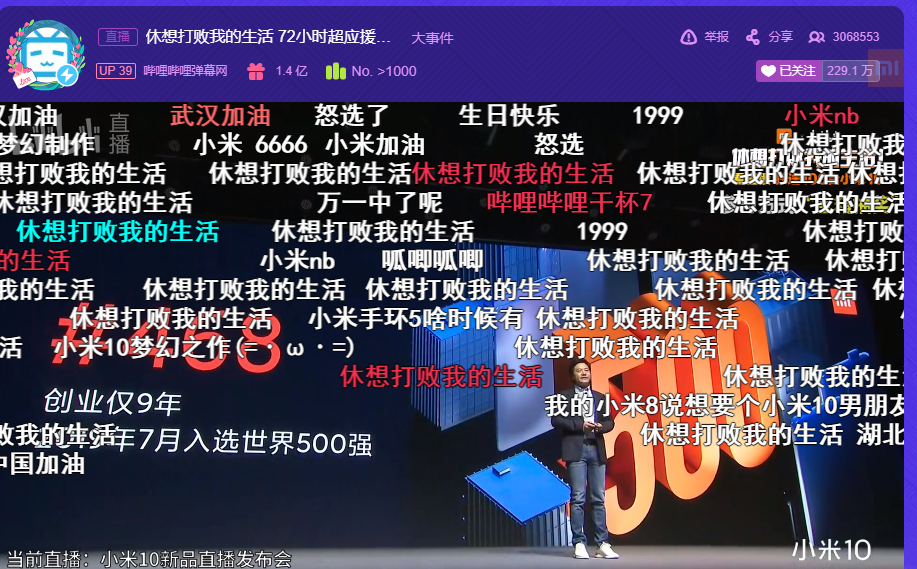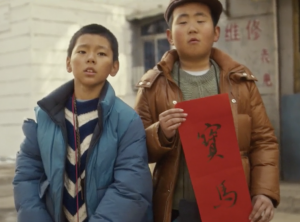
Xiaomi’s Mi 10 launch on Bilibili drew a barrage of bullet comments from viewers
Thank you for being a valued reader of China Brand Insider. To bring you greater insights into the world of brand-supported content, we are rebranding as Content Commerce Insider. Our newsletter will increase in frequency to twice per week, and we will continue to bring you exclusive reports, case studies, interviews, and market analysis not found elsewhere. Check out our new site here and use this link to subscribe and read the newsletter on Substack.
Branding through a lockdown
Sentiment around the coronavirus took a marked turn for the worse last week when a reclassification of diagnostic criteria brought about huge spike in case numbers, dimming hopes for any near-term good news, while a New York Times report estimates that 760 million people (or more than half the population) are subject to various restrictions on their movements as Beijing steps up efforts to bring the outbreak under control.
Even in these rough times, brands are cautiously increasing their activity in ways that are sensitive and relevant to the concerns of consumers, many of whom continue to spend the majority of their time at home with limited excursions outside. Instead of quietly waiting out the crisis on the sidelines, these brands are communicating in ways that show understanding.
While rivals are delaying their new product launches, mobile phone maker Xiaomi joined hands with video platform Bilibili for one of the biggest brand campaigns we’ve seen so far, debuting its Mi 10 flagship 5G smart phone online as part of a 72-hour inspirational streaming event titled “Life Is Not Made for Defeat.”
A two-hour press conference for the Mi 10 was livestreamed on February 13 and featured a teary-eyed interview with Xiaomi founder Lei Jun, followed by an unboxing of the phone by a popular Bilibili creator and product giveaways over the course of the three-day event, which included coronavirus-related content such as vlogs from Wuhan residents, educational programming, a virtual art exhibit, and original songs intended to cheer viewers. In total, the event drew 21 million views from 12 million unique visitors, and 2.6 million comments in Bilibili’s signature “bullet chat” format that streams user commentary across the screen in real time.
Let no good deed go unnoticed

Home appliance brand Midea shot a video for a charity song it released
Many brands have made donations of cash, goods and services, which are widely appreciated by consumers. Shenzhen Satellite TV offered to publicize these efforts by giving free airtime to companies to share what they’ve been up to. So far a total of 91 brands have signed up — including Western names such as Pizza Hut, M&Ms and Abbott — for 15-second spots highlighting their charitable work.
Propaganda-style content such as “charity songs” has seen a resurgence during this outbreak to boost morale among the citizenry. While largely promoted by official departments, brands have also started producing relevant content:
- Home appliance maker Midea released a video for a song it produced to honor frontline medical workers and noting its donations, which have included RMB 100 million in cash along with 4.5 million masks and 100 air-conditioning units.
- Grocery app Miss Fresh (Meiri Youxian) made a short documentary about its delivery staff, who have been in high demand with the outbreak as the company has seen a more than three-fold increase in year-on-year revenues during the Spring Festival holiday period.
- Kitchen appliance brand Fotile canceled a planned Spring Festival celebration to mark 18 years of working with creative agency SGAD, opting instead to share a documentary of footage it compiled of people cooking at home during the outbreak.
- Procter & Gamble worked with JD.com’s livestreaming platform to host a regular broadcast featuring P&G scientists and medical specialists discussing virus protection and other topics.
- Hunan TV completely reworked its Lantern Festival gala show on February 8 to focus on uplifting content about the fight against the coronavirus. E-commerce platform Pinduoduo stayed on as the title sponsor, though it limited additional activities tied to the show.
Love in the time of coronavirus

Virtual couples via Tmall and Taobao Life
Although China has its own traditional version of Valentine’s Day, the mid-summer Qixi festival, the Western holiday is also celebrated in the country, particularly among urban youth. This year saw a steep drop in activity as many restaurants, stores and entertainment venues remained closed, and even those that stayed open drew very few customers.
Internet users have used humor to mark the holiday, creating memes such as bouquets of masks, mask-friendly eye makeup tutorials and a notice that Valentine’s Day will be postponed to March 8 (aka International Women’s Day).
While many Valentine’s Day marketing plans were set well before coronavirus turned everything upside down, some brands adapted their campaigns to reflect coronavirus impacts such as the involuntary separation of couples who’ve had their travel plans upended.
- Sports brand Fila created a short film in collaboration with the Chinese edition of Harper’s Bazaar about a couple’s first encounter and followed up with a collection of images of 193 couples and a Weibo forum and interactive game to connect long-distance partners.
- Tmall and the game Taobao Life developed a virtual fashion-focused campaign which allowed consumers to dress their Taobao game avatars in outfits from brands such as Burberry, Marni and Diesel, and pair themselves with a partner to create a digital poster image.
- Crossborder e-commerce platform Kaola’s campaign, “2020 Watch Over & Wait For,” invited customers to create short videos and graphics to share their love stories and win special gift boxes.
- Personal care brand Dove released an illustrated series, “You Are More Beautiful With Short Hair,” celebrating “authentic beauty” and offering another take on a controversial practice of shaving the heads of female medical personnel.
Party at home

Livestreaming musical festivities are taking off in China
In addition to Bilibili’s 72-hour “Life Is Not Made for Defeat” event mentioned above, we are seeing more and more streaming content festivities intended to create a celebratory sense of community among young Chinese, who are going on four weeks of being more or less housebound. Earlier this month, Modern Sky streamed content from its Strawberry Music Festival series via Bilibili, and music activity heated up for Valentine’s Day with competing livestreaming shows on Douyin, Kuaishou and Taobao Live. Relatively few of these featured brand sponsors, but a February 14 show by Merrie Records streamed on Bilibili was supported by Kind Bars, Wanen Coffee and speaker brand Sonos.
Brand film pick: Baidu’s “I Really Miss Ayi” (我好想阿姨)
Baidu created a low-key film for Valentine’s Day to promote the use of its smart home assistant to help ease the hardships of life under the coronavirus epidemic. It shows the struggles of an urban family with a young child cooped up in their apartment while their ayi (nanny/housekeeper) is stranded indefinitely back in her home village, where she went to spend the Spring Festival holiday. Baidu’s home products come to the rescue, keeping the active little girl entertained and giving the married couple some respite during a quiet night in.
Like much of the content that touches on the outbreak, production values are fairly low, but it’s a good example of a quickly turned around piece that can resonate with viewers who find themselves in similar circumstances.
News in English
- Even while at home, 85% of Chinese people prefer to use their phones to access content, and other stats on the coronavirus impacts on media consumption. Campaign Asia
- More data from a report by QuestMobile shows which tech companies have gained and lost as a result of coronavirus. WalktheChat
- Tencent has upped its stake in Bilibili to 18%, making it the video platform’s largest shareholder. Yicai Global
- Property firms are among the offline businesses that are turning to virtual showrooms and livestreaming to drum up business. Reuters
- More brand advice: Put sales worries aside and focus on building brand equity through entertainment, education and empathy. Forbes
- Bytedance’s share of the Chinese ad market has gone from 5% to 22% in two years, eating in to the revenues of the traditional big three BAT firms (Baidu, Alibaba and Tencent). Technode
- NBA commissioner Adam Silver said the league’s standoff with China over freedom of expression will cost it hundreds of millions of dollars, but ““probably less than $400 million.” The Wall Street Journal
We’ve got China covered





